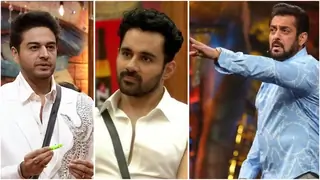A paternal uncle was usually called simply "father" (pitṛ). For example, Saṃjaya speaking to Dhṛtarāṣṭra in Bhīṣmaparvan refers to his paternal uncle Bhīṣma nineteen times as "pitā Devavratas tava" - your father (pitā - nominative) Devavrata.
Wherever Vyāsa is called Dhṛtarāṣṭra's father, the audience for whom Mahābhārata was composed would have understood that it was simply the polite way to refer to Vicitravīrya's kānīna brother, regardless of Vyāsa begetting Dhṛtarāṣṭra.
To be unnecessarily specific, a paternal uncle could be called an oldest/older/middle/younger/youngest father (Udyogaparvan 145.8), similar to Telugu kinship terms:
pitā yavīyān asmākaṃ kṣattā dharmabhṛtāṃ varaḥ
putra-śok'ābhisaṃtaptaḥ kim āha Dhṛtarāṣṭrajam
Yudhiṣṭhira asks Kṛṣṇa, "Our younger (yavīyān - nominative) father (pitā - nominative), the steward (Vidura), the best of those who adhere to dharma, who is afflicted by grief for his sons, what did he say to the one born of Dhṛtarāṣṭra?
The word yavīyān means the younger of two, and implies that Yudhiṣṭhira regarded Dhṛtarāṣṭra as jyāyān, the elder of two. The sons of Somadatta were also of Pāṇḍu's generation, but I don't think they are ever given the status of fathers by the Pāṇḍavas. Curiously, they seem to be regarded as the Pāṇḍavas' brothers (Udyogaparvan 30.21, Droṇaparvan 118.29).
There is a specific word for paternal uncle - pitṛvya ("equal of a father"), which is used only twice in the entire Mahābhārata text. One occasion is Droṇaparvan 24.25, where Sutasoma pierces his own paternal uncle (svapitṛvyaṃ - accusative) Viviṃśati - Bhīma's patrilineal cousin - with arrows. The other is Bhīṣmaparvan 86.6-9, where Irāvat is disowned by his paternal uncle (pitṛvyeṇa - instrumental), Ulūpī's first husband's brother or patrilineal cousin.
Arjunasy'ātha dāyāda Irāvān nāma vīryavān
sutāyāṃ Nāga-rājasya jātaḥ Pārthena dhīmatā
Airāvatena sā dattā anapatyā mahātmanā
patyau hate Suparṇena kṛpaṇā dīna-cetanā
bhāryā'rthaṃ tāṃ ca jagrāha Pārthaḥ kāma-vaś'ānugām
evam eṣa samutpannaḥ para-kṣetrE'rjun'ātmajaḥ
sa Nāga-loke saṃvṛddho mātrā ca parirakṣitaḥ
pitṛvyeṇa parityaktaḥ Pārtha-dveṣād durātmanā
Now, Arjuna's heir (dāyādaḥ - nominative) named Irāvat was valiant, begotten in the Nāga king's daughter (sutāyāṃ - locative) by the intelligent son of Pṛthā. Childless (anapatyā - nominative), she was given by the grand-natured Airāvata (presumably her father-in-law, not her father Kauravya), when her husband (patyau - locative) had been killed by Suparṇa (Garuḍa) and she was pitiable, depressed in mood. And Pṛthā's son took her as wife (bhāryā'rthaṃ - accusative), when she followed the command of desire. So he was born in another man's field (para-kṣetre - locative), Arjuna's son (ātmajaḥ - nominative). He was raised in the Nāga world, guarded by his mother (mātrā - instrumental), and disowned by his bad-natured paternal uncle (pitṛvyeṇa - instrumental) who hated Pṛthā's son (perhaps because he wanted to beget children with Ulūpī himself, or perhaps because Arjuna killed Takṣaka's wife, Aśvasena's mother).
We can infer that the specific word pitṛvya was only used when the paternal uncle was hostile to his nephew, and the everyday use of pitṛ connoted the societal expectation that paternal uncle and nephew should behave like father and son.
Edited by BrhannadaArmour - 2 years ago






















